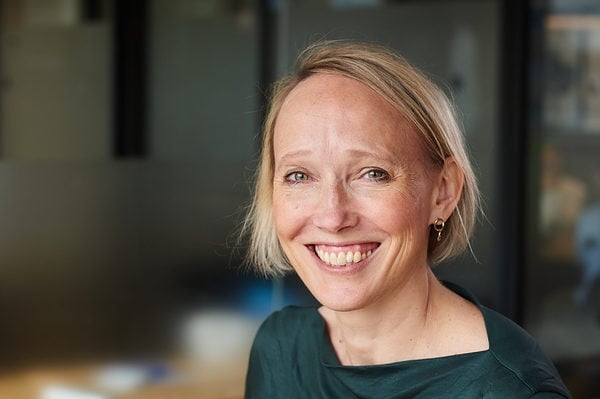
Insight: What remaining barriers tell us about women’s progress in fintech
Kate Marsden | Insights, News, Women In Open Banking
28 Jun 2024
I love my job – I have worked in the tech industry for almost 30 years, since the beginning of the first dot-com boom, for some large companies and many smaller ones. I’ve created websites, designed apps; written scripts for natural language chatbots, and support articles for sub-Saharan smart meter installations.
I’ve contributed to the strategic direction of international telcos, project-led company acquisitions, built and nurtured numerous B2B fintech brands. It has been varied, challenging, fast-moving and always interesting. I’ve worked with some brilliant people, and only once experienced any obvious gender-based discrimination.

Kate Marsden, chief marketing officer at Yaspa
So when, in my role as chief marketing officer at Open Banking payments provider Yaspa, I agreed to write a piece for Women in Open Banking about ‘women in fintech’, I thought it would be simple. My wonderful colleague, Amie Kadhim, won Open Banking Expo’s Women in Open Banking Rising Star Award last year.
She was one of the first women to join the company; I was the third. At the time Yaspa had, by its own admission, a distinct ‘tech-bro’ vibe. But, that in itself was not a problem, mainly because everyone was also kind. Nice. Helpful. Inclusive. Unfortunately, it turns out, this has not been the case for others.
Where are we now?
Where I, naively, assumed that there were no longer any material barriers to women working in this field, I’ve been sorely disappointed. In an unofficial poll with the Women in Open Banking network (WiOB), 97% of respondents (and counting) felt barriers existed.
Conversations with several members have revealed stories of bullying and discrimination; of interviewing women solely to meet quotas; of men who seem to have progressed up a corporate ladder while women got “left behind”. The issues discussed have been broad and complex, some still – in Mexico, for example – requiring major macroeconomic shifts to ensure equality in education and financial literacy.
No-one, interestingly, mentioned an adverse impact from child-rearing or care-giving, which offers some reassurance.
What was notable was that many of the harshest experiences were in the mid-size corporates, banks and financial institutions, with tight ‘boys’ networks’ that it was impossible to break, and where diversity – of experience and opinion – was not welcomed, often in the ‘fin’ bit of ‘fintech’.
Kadhim’s view on what Yaspa is doing right is that we have “a brilliant CEO who has never made [her] feel like a ‘woman’”; that she has allies among the wider team, allowing her to be “taken seriously”; and that we have always hired based on merit.
That last point feels blindingly obvious, but for all the women I have spoken to saying they lost out on a job to a man, I am beginning to hear more from (white, male, middle-aged) colleagues that they are losing out on roles to ensure hiring companies meet diversity quotas.
Both experiences are alarming. I am the mother of two boys. They are diametrically opposed to each other in every single aspect: looks, personality, skills, emotional and intelligence quotients. There is no way in which I could draw any conclusion about ‘boys’ from looking at my teenagers, any more than I can say “women are good at x and men good at y”.
While I have the utmost sympathy for HR managers in larger organisations, the ability of smaller tech companies to be able to hire solely on merit is, it seems, precious, and should be valued – and maintained as we grow.
Being proactive
But, and this is the rub, it is undoubtedly of value to have figureheads in an organisation to look up to, and model opportunities for our future career trajectories.
At Yaspa, we have used fractional and part-time posts to facilitate this successfully in the more senior positions. At the other end of the career ladder, the UK’s apprenticeship scheme has brought Yaspa some excellent young people into new roles, and we do not take lightly the responsibility of ensuring that their first experience of the workplace is a positive one.
We’re still not perfect. For a recent backend development role, only 6% of applicants were women, and I would like to see what we can do to help drive change there, while still maintaining a meritocratic hiring process.
Our board is also all-male, as are our founding partners, and there is still a very long way to go, even in the UK, in this area. In 2024, just 18% of high-growth enterprises include one or more women on the founding team, according to the Women-Led High-Growth Enterprise Taskforce.
This is not going to change overnight. I am conscious from my own experience at founding a company that I went into it with insufficient confidence and ambition, and would have benefited at the time from outside investment, as well as more instructive mentoring (having a baby a month after launch did not help).
But it’s not just support at the founding stage that’s of value, it’s throughout our careers, and it’s up to each of us to proactively find what we need – and if it doesn’t exist, then set it up.
Authenticity
A final few observations based on the comments from the WiOB network. One of the most notable themes has been the desire of individuals to be able to “be themselves”, and the more we can encourage our colleagues to be authentic, the better. For those suffering from imposter syndrome, I can say that even after almost 30 years of work that doesn’t go away.
Some advice from another contributor: “Be the person who gives people their flowers now, and lift as you climb”. That is to say, thank and support others, bringing them with you as you grow.
I am sorry, in some respects, that we even need a WiOB community, but it has been super interesting for me personally to take some time to reflect on where we are and where we’re going.
I take heart from the benefit of sharing experiences, of reality checking what a good working environment could and should be. Even during difficult times there is always learning to be gained. So be true to yourself, be generous to others, call out discrimination if you see it, and help continue to drive forward an industry that the next generation would be proud to be part of.
Kate Marsden is chief marketing officer at Yaspa
With thanks to all those at Yaspa and in the Women in Open Banking network who contributed to this piece. Unless indicated, all opinions expressed are those of the author.
Further reading:
Women-Led High-Growth Enterprise Taskforce (HM Government, 2024)
Why Are There So Few Female Software Developers?
Women in Open Banking survey finds gender a factor in career progression









